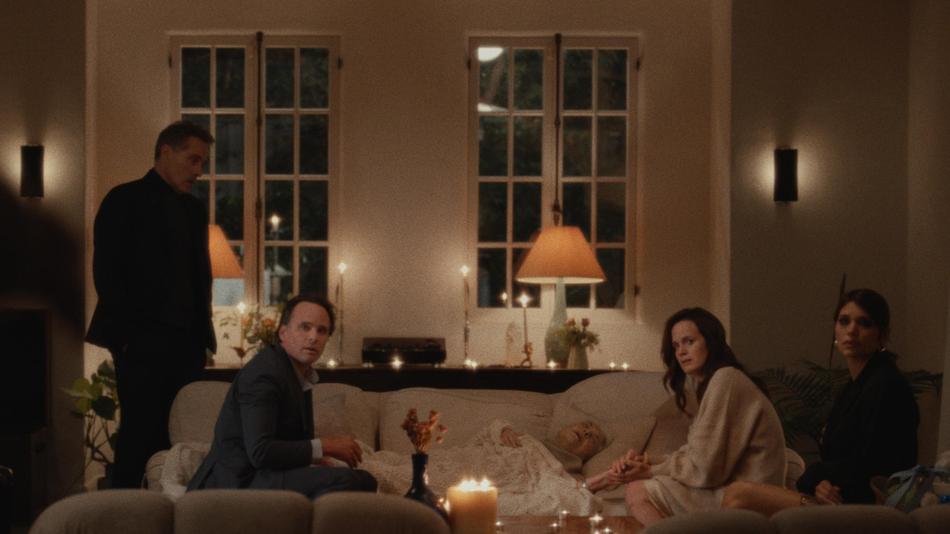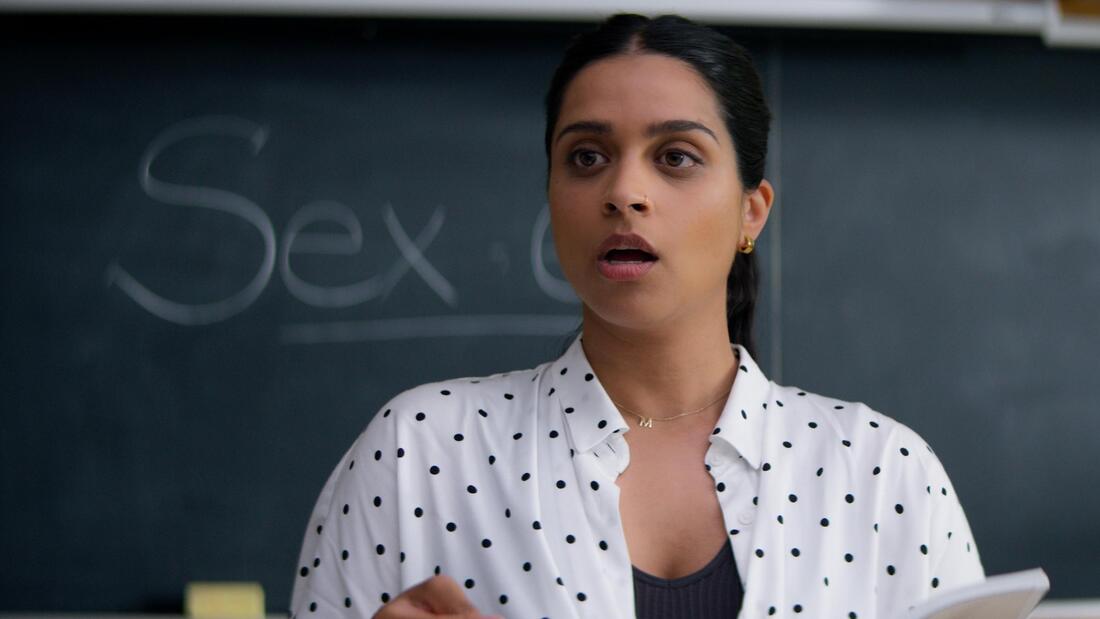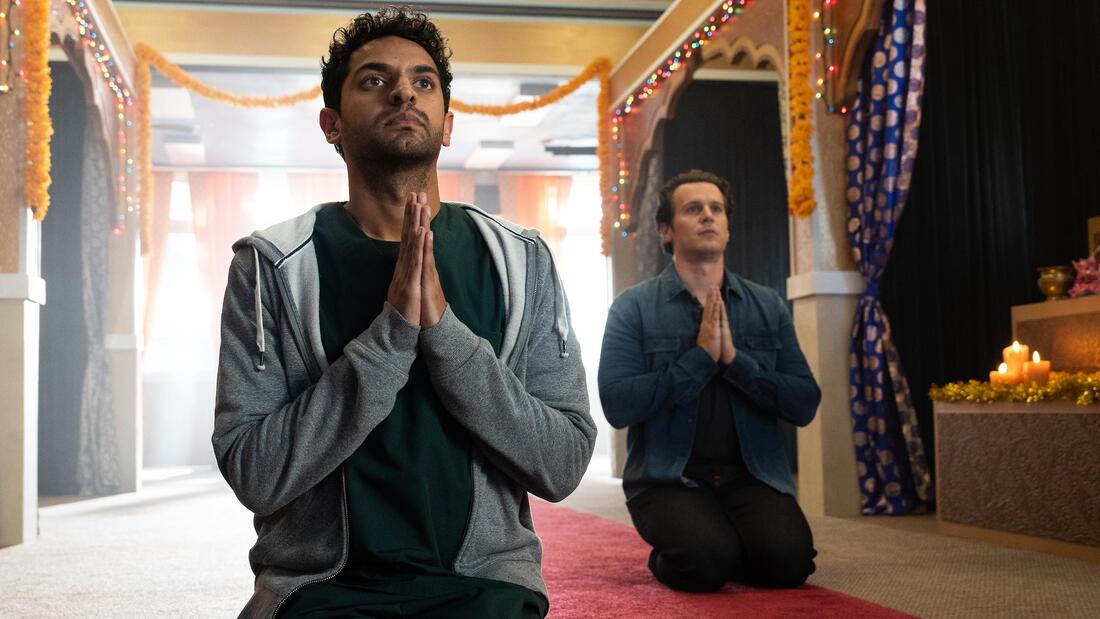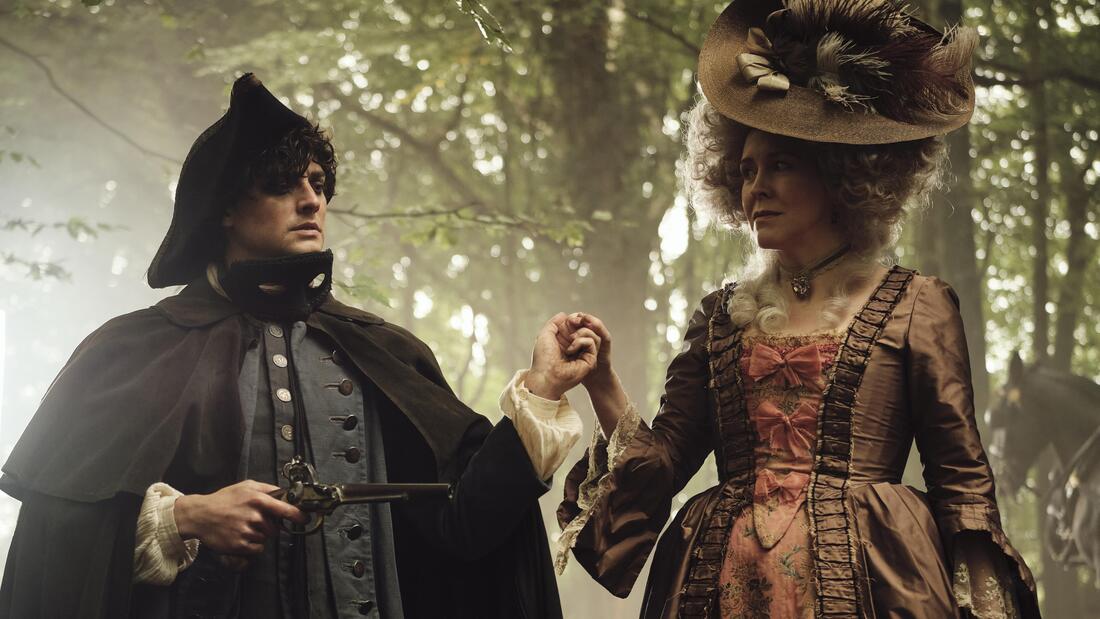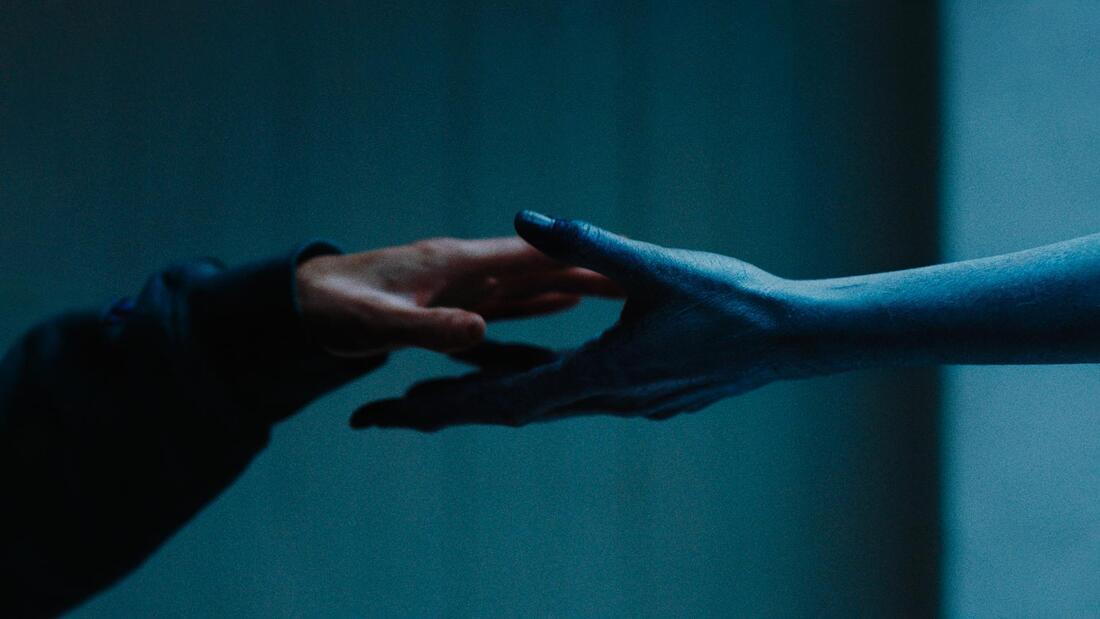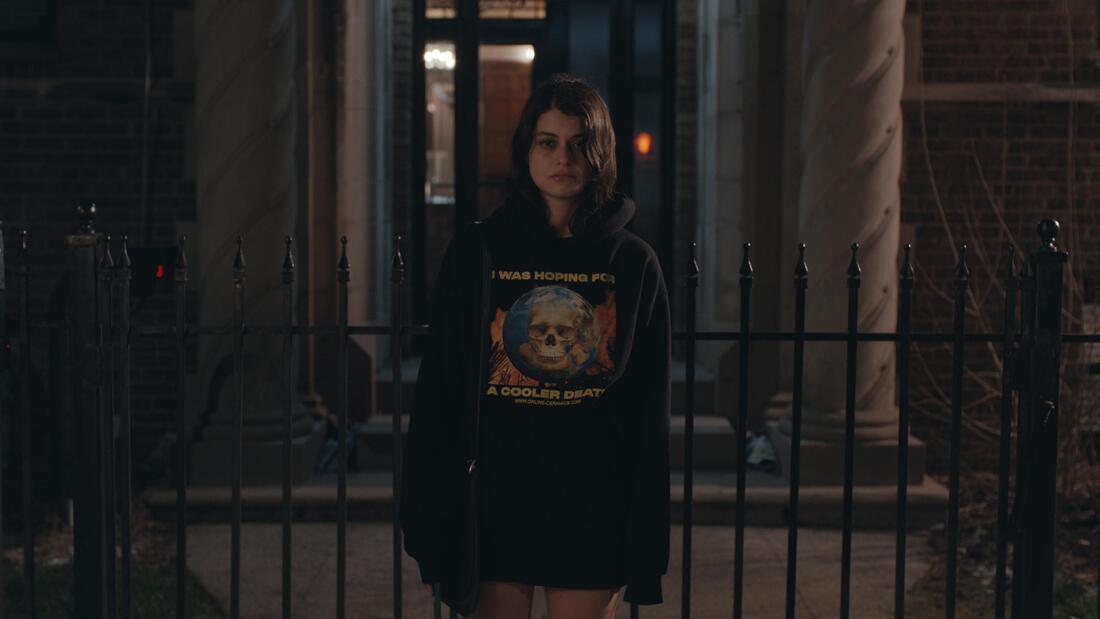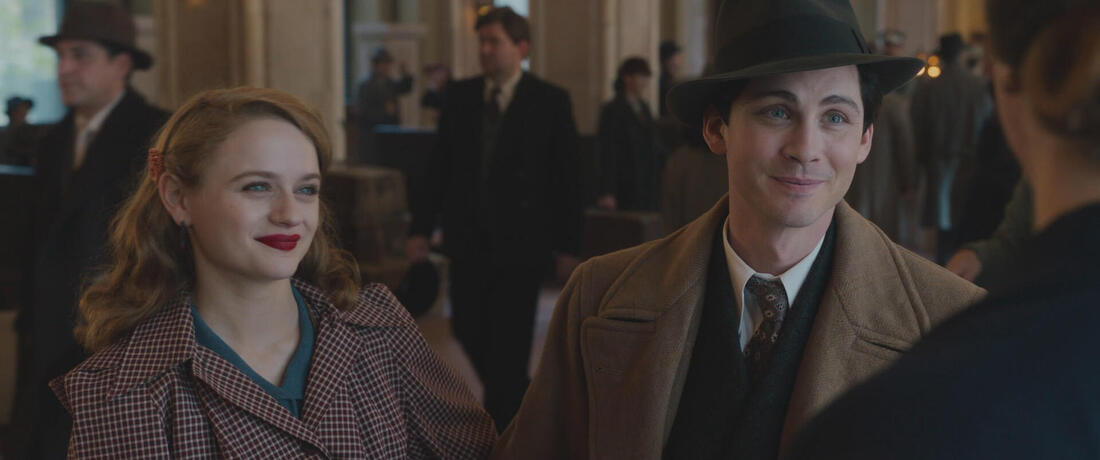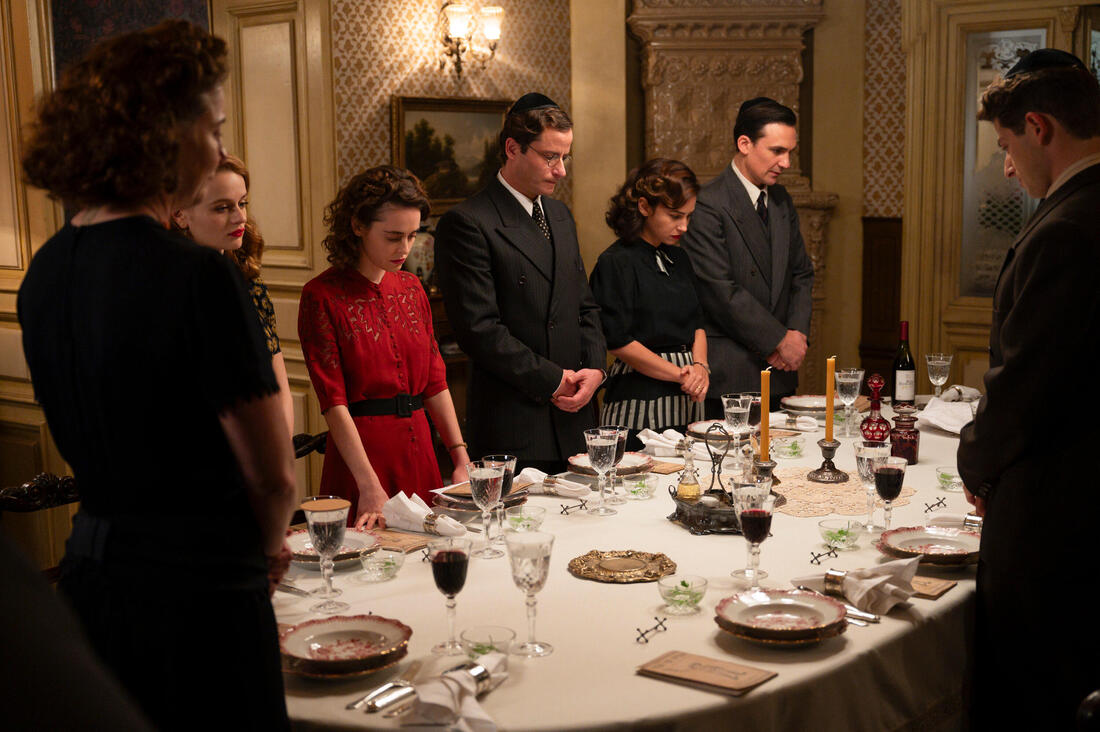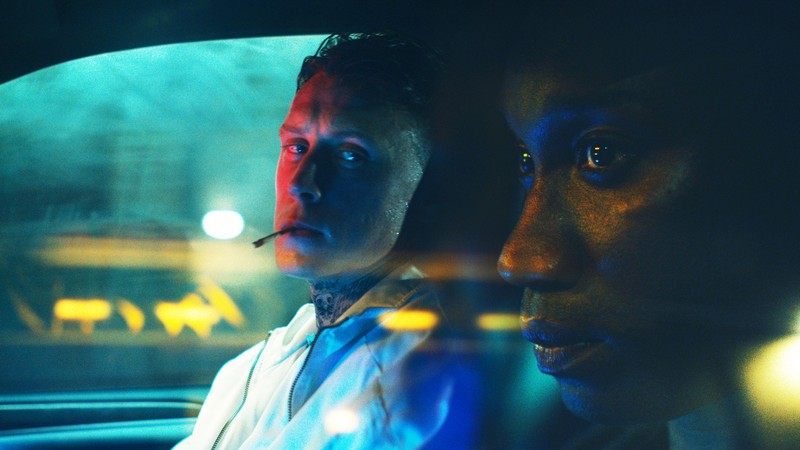|
Review by Sean Boelman
With a cast led by Walton Goggins and Pedro Pascal, there’s no question that Nadia Conners’s directorial debut, The Uninvited, was one of the most hotly-anticipated premieres of this year’s SXSW. Yet despite its star-studded ensemble, The Uninvited is a waste of time due to a script that simply isn’t interesting.
The film follows the hosts and attendees of a party that is crashed by a senile old woman who claims to live there, as tensions spark between the guests and drama forms. Although this seems like the set-up for a great thriller, Conners instead opts to go the comedic route, which would be acceptable if there were anything particularly funny about it. After the first half hour or so of quick-paced dialogue (Conners apparently initially created this as a play before deciding to make it into a movie), it becomes clear that The Uninvited is spinning its wheels. It puts the characters in one situation after another, but none of them build off of each other in a meaningful or intriguing way. The Uninvited fails to take advantage of the potential geography of its setting. The production design of the Hollywood mansion in which the film is set is mildly impressive, but it’s put to no use. While this could easily have been used to parody the excess of the Hollywood elite she is “skewering,” Conners largely ignores it with her directorial eye. Conners also struggles to juggle the movie’s themes. At many points, the film plays out like a straightforward, old-school morality tale. The characters are presented with a decision and given choices of how to proceed, with the conflict coming from what those decisions reveal about the characters. At other points, the movie seems interested in deeper commentary on topics like ageism in Hollywood. Because of this, everything feels underdeveloped. However, the cardinal sin of The Uninvited is its character development. The first act convinces us that these are shallow, perhaps even horrible people, only for the rest of the film to ask us to pity them. As a result, viewers will feel a massive disconnect from the conflict. Conners gives us very little reason to care about the characters, resulting in an unconvincing mess. The cast of The Uninvited brings a real “favor was called in” energy to it. The lead, Elizabeth Reaser, is fine — but she’s the only one with any meaty material to work with. Goggins (who is married to writer-director Conners) gives it his all, but the character does not serve him well. The other stars, including Rufus Sewell, Lois Smith, and the incredibly buzzy Pascal, make little impact in either direction because they aren’t given anything to do. Many people will be drawn to The Uninvited due to its cast, but they’re all put to waste in a movie that goes nowhere. While it’s nice to see Conners get the chance to make a film, this is the type of directorial debut that attempts to ride on its star power because the voice behind the camera just doesn’t have the juice. The Uninvited screened at the 2024 SXSW Film Festival, which ran March 8-16 in Austin, TX. Rating: 2/5
0 Comments
Review by Sean Boelman
In the raunchy comedy genre, following storytelling conventions is often okay as long as the jokes always land. This is the case with Doin’ It, a riotous new sex comedy that also has something on its mind, resulting in one of the best entries into the genre since its heyday in the 2000s.
The film follows an ambitious, book-smart Indian-American woman who finds herself in over her head after she is assigned to be the substitute teacher for a high school sex-ed class… despite never having had sex in her life. Although the story is very predictable, the movie is so consistently hilarious that it overcomes its occasionally conventional storytelling. Unlike most raunchy comedies, Doin’ It does not feel crude or cruel. It doesn’t really shame the protagonist for her sexual inexperience, using it instead as a starting point for a discussion of sexual liberation — in more ways than the traditional definition. Yes, there’s a lot of secondhand embarrassment, but it still feels wholesome, like we’re laughing with her, not at her. Still, what is most surprising about Doin’ It is that it is a message movie through and through, yet it doesn't feel overly didactic despite its clear message. At several points, characters go on diatribes about the need for more comprehensive sex education programs. While this message in a raunchy comedy is probably preaching to the sex-positive choir, it makes this feel much more important than the average comedy flick. The film also impresses in how well it balances its different storylines. We have her lesson planning, the protagonist’s romantic subplot, a rivalry with another teacher, and a few other side stories that bring the narrative together nicely. Although none of these breaks the formula, it’s an effective combination of these tropes to make a great comedy. Lead actress Lilly Singh, who also co-wrote the script, is an absolute discovery. She has a commanding screen presence but also a charm that lends itself nicely to the romantic comedy aspects of the story. This is a star-making-level performance from the comedian, and if there’s any justice in the world, she’ll become Hollywood’s go-to for sidekick characters in comedies because she’d absolutely nail that archetype. Some notable faces make cameos in the supporting cast, presumably to boost the movie’s profile. Stephanie Beatriz (Brooklyn Nine-Nine) and Utkarsh Ambudkar (Free Guy) aren’t entirely necessary. On the one hand, they don’t feel fully utilized; however, their relatively low-key roles with only a few funny scenes give Singh the spotlight she deserves. Doin’ It is so funny that you’ll be laughing for every minute of its 90-ish minute runtime, but it also doesn’t have any lack of heart. Sara Zandieh and Lilly Singh have made a raunchy comedy for the ages, and one with a great message at that, making this a must-see entry into the genre. Doin’ It screened at the 2024 SXSW Film Festival, which ran March 8-16 in Austin, TX. Rating: 4/5
Review by Sean Boelman
Real-life couple Roshan Sethi and Karan Soni worked together as director and actor on the former’s directorial debut, 7 Days, but their second collaboration takes it to a new level. A Nice Indian Boy is a gay rom-com that’s hard not to love, offering a refreshing gay spin on a familiar storyline.
Adapted from a play by Madhuri Shekar, the film follows an Indian young man who wants nothing more than to have a big Indian wedding, to the dismay of his traditional family, who struggles to reconcile with him being gay. Although the story follows many of the typical beats of the rom-com, it’s such a well-told story that it’s very charming. A Nice Indian Boy has tons of laughs, but none of them break the mold. It’s predominantly fish-out-of-water comedy from the gay protagonist being in heteronormative situations and his white love interest being in scenarios in which he seemingly does not belong. Seeing a romantic comedy that’s wholesome and uplifting like this, not falling back on raunchy jokes, is pretty refreshing. It will come as no surprise that the movie has a lovely message about being LGBTQIA+ in a conservative family and community. Although the film doesn’t add anything new to the conversation, it feels thoroughly authentic — no doubt thanks to the director/actor duo of Sethi and Soni — making the movie feel refreshing despite its familiarity. The most impressive thing about A Nice Indian Boy, though, is Karan Soni’s leading performance. The world has long known how funny Soni can be, and he certainly is here, but this film also affords him a rare opportunity to showcase his dramatic chops. His performance, like the movie, manages to be both incredibly specific and broadly relatable at the same time, making him one of the most compelling rom-com leads in recent memory. Jonathan Groff also brings a certain ineffable charm to his role as Soni’s love interest. His character is undoubtedly weird, but Groff plays it off in a way that’s still believably lovable and alluring. Sunita Mani gets a few amusing scenes in her supporting role, and Zarna Garg and Harish Patel are great — if a bit by the book — as Soni’s parents. Although the film isn’t particularly flashy, it does manage to avoid the often confined feeling of movies adapted from plays. Instead, it largely adopts the generic style of the modern rom-com: agreeable but not especially interesting from a visual standpoint. Apart from one sequence at the end that incorporates traditional music and dance, the film lacks much of a distinct visual identity. A Nice Indian Boy rides on the strength of its representation and the charisma and chemistry of its leads to stand out beyond its rom-com tropes. However, there’s something inexplicably satisfying about a rom-com this cute — especially when it’s about a gay couple — so it’s easy to write off how safe it can be at times. A Nice Indian Boy screened at the 2024 SXSW Film Festival, which ran March 8-16 in Austin, TX. Rating: 3.5/5 [SXSW 2024] TIMESTALKER -- Indie Sci-Fi Romance Is Occasionally Derivative, but Usually Fun3/23/2024
Review by Sean Boelman
Alice Lowe’s directorial debut, Prevenge, was a microbudget horror-comedy that found a cult following thanks to its wacky concept and wicked sense of humor. Her sophomore feature, Timestalker, is much more ambitious, and while it’s not exactly original, it does reaffirm Lowe as an exciting new filmmaker on the genre scene.
The film follows a woman through several eras as she is reincarnated time and time again after falling in love with the wrong man and coming to an untimely end. It’s a mix of sci-fi, horror-comedy, star-crossed lovers romance, and paranoia thriller, and while it’s a lot for one movie, the experience is pretty consistently entertaining. Both narratively and stylistically, Timestalker lives in the shadow of other, more effective movies that have been released recently. Unfortunately, Everything Everywhere All at Once becomes an immediate comparison because of some of the editing and cinematography choices, and the screenplay shares a shade similar to Bertrand Bonello’s The Beast. (Although Timestalker was being ideated before the release of the aforementioned films, it is the unfortunate victim of timing.) Lowe also struggles with the character dynamics. Throughout the movie, the characters’ motivations become more complex as the truth of their realities is revealed. Lowe certainly deserves points for the ambition of her script, even if not all of the film’s big swings pay off satisfyingly. The movie’s themes are intriguing, exploring the spectrum between love and obsession. The commentary doesn’t run particularly deep, and any subtext becomes text in a third-act exposition dump meant to pull the rug out from under the audience and ends up spelling out what the audience should feel about the past hour and a half of conflict. Still, Timestalker is very successful in its production values, especially considering that this is an independent production with a modest budget. The production design and costuming work are impressive, which is quite a feat since the story is set in multiple time periods. And while there’s not a ton of gore, the special effects, when present, are quite good. The strongest aspect of Timestalker, though, is its cast. Lowe plays the lead role and perfectly captures the balance between charm and nuisance. The supporting cast also shines, though, with a funny performance by Nick Frost, an enigmatic turn by Jacob Anderson, and incredibly lovable appearances by Aneurin Barnard and Tanya Reynolds. Timestalker isn’t nearly as innovative or fresh as it seems to think it is, but it is a ton of fun. Strong direction, good gags, and a committed cast elevate this movie — and while it’s unfortunate that it will be overshadowed by similar films that have come out recently, it will likely find a good deal of stalkers fans among a cult audience. Timestalker screened at the 2024 SXSW Film Festival, which ran March 8-16 in Austin, TX. Rating: 3.5/5
Review by Sean Boelman
In the horror genre, a good story is often just as important as being scary. However, there are some times when the atmosphere is so strong that it can carry a weak script. That’s the case with Benjamin Finkel’s Family, a genuinely unsettling film that only works if you overlook its glaring writing issues.
The movie follows a young girl whose well-intentioned prayers for her dying father become something much more sinister. To put it nicely, the plot is utter nonsense. A lot of things happen, and the film moves from point A to point B, but the motivations and arcs are illogical. But despite this, it’s a ton of fun to watch. Trying to make sense of what the movie has to say is even more in vain. The themes are incredibly underdeveloped. In many ways, it feels like it’s trying to explore the concept of familial trauma a la Hereditary, but Wilson’s mother character isn’t developed enough for this to work. At other points, it seems like a more straightforward commentary on grief, and this angle simply isn’t interesting. The character development isn’t much more intriguing. The protagonist has an ailing father, a (questionably) abusive mother, and a rabbi grandfather she turns to for guidance in the face of supernatural happenings — all archetypes that are thoroughly worn. Worse yet, the protagonist lacks much of a personality of her own. Still, for as lackluster as his script can be, Finkel is one hell of a director. He manages to create a consistently engaging and often downright chilling atmosphere here. It’s a loud, in-your-face horror flick with a blaring score, aggressive imagery, and many jump scares. But in many ways, it’s effective at achieving what it sets out to do. Much of the film’s success can also be attributed to supporting actress Ruth Wilson, who hams it up in all the right ways. Wilson takes the movie incredibly sincerely, making the performance all the more intimidating even though some of the things she does are deeply unserious. The rest of the small cast is fine, but this is almost entirely Wilson’s show. The film is impressive visually, if not entirely original. A lot of the visual symbolism can be seen as a carbon copy of other movies that came before it, with Annihilation being the most obvious example. However, Elisha Christian’s cinematography and Olivia Peebles’s production design are very formally accomplished. Family is a jumbled mess of a movie, and trying to figure out what’s happening or — more importantly — why is futile. Still, Benjamin Finkel does such a good job with the atmosphere, and Ruth Wilson’s performance is so incredible that the film works regardless. Family screened at the 2024 SXSW Film Festival, which ran March 8-16 in Austin, TX. Rating: 3/5 [SXSW 2024] I LOVE YOU FOREVER -- Well-Meaning Film Wants To Be, but Is Accidentally Insensitive3/23/2024
Review by Sean Boelman
Cazzie David and Elisa Kalani clearly want to be the next great social commentators. Produced by Diablo Cody, their feature debut, I Love You Forever, wants to defy the audience’s expectations so badly that it loses sight of what’s most important: exploring its themes in a way that’s intriguing or — at the bare minimum — tasteful.
I Love You Forever is described as a “subversive romantic comedy” about a young woman in an abusive relationship. Although there is a lot of potential in this premise, it ends up feeling like a recipe for disaster, as the jarring tonal shifts lean much more on the side of insensitive than provocative and insightful. The first half of the film is quite effective — an awkward but funny romantic comedy. There’s a ticking time bomb element, as things are clearly awry, but it’s mostly compelling. Unfortunately, when the movie attempts to make a (much) more ambitious swing in its back half, it ultimately falls flat. There is certainly a conversation that needs to be had about domestic violence and relationship abuse, but this is assuredly not the way to do it. David and Kalani lack the tact to pull off the delicate balance they’re trying to strike. The result is some scenes feel like they’re being played off as jokes when, in reality, they should be treated with incredible seriousness. The characters’ arcs also don’t make much sense. The timeline becomes erratic, and characters begin to turn on a dime. Perhaps this is entirely purposeful, intended to illustrate how unpredictable people can be in toxic relationships. But this also makes the cautionary tale aspect of the movie completely stall out. However, the script is not the only culprit for the film’s failures — David and Kalani’s direction is equally misguided. Some of the cheap looks can be forgiven because of a clearly small budget, but the editing and overproduction of the sound do the movie absolutely no favors when it comes to tone. The performances in I Love You Forever aren’t very good — well, at least in the second half — but more blame has to be put on the script than the actors. You can see Sofia Black D’Elia and Ray Nicholson's potential in their roles, but their delivery in the second half is atrocious. The only person who’s completely innocent is Jon Rudnitsky, who’s consistently fun to watch as the comedic relief/sidekick. Cazzie David and Elisa Kalani clearly meant well when making I Love You Forever, but the result is so bad and borderline offensive that it’s hard even to respect what the film was going for. It is baffling how many wrong choices the filmmaker duo made, creating one of the most infuriating misfires in recent memory. I Love You Forever screened at the 2024 SXSW Film Festival, which ran March 8-16 in Austin, TX. Rating: 1.5/5
Review by Sean Boelman
Making a movie about a “current” topic like cryptocurrency is a challenging prospect. It could be incredibly prescient, or it could feel immediately dated. That’s the least of the problems with Cutter Hodierne’s Cold Wallet, though. Despite the endorsement of iconic and talented crime filmmaker Steven Soderbergh, Cold Wallet is just another run-of-the-mill B-movie — and not a very good one at that.
Cold Wallet follows a group of people who, after losing their life’s savings in a cryptocurrency scam, decide to take things into their own hands and steal the money back from the man who screwed them over. Despite this intriguing premise, this is about as vapid as they come, with nothing of artistic merit and little of entertainment value. The film is mainly held back by its dialogue, which is frankly atrocious. One line in the movie said with a completely straight face, “You have a missed call from a guy named Guy. Who is this guy?” sticks out as an example of John Hibey’s screenplay lacking the basics, not just of screenwriting but also of the English language. It’s like they didn’t even read the script through to see if everything made sense. Speaking of not making sense, the character motivations are completely illogical. You have a father trying to provide for his family, a rich billionaire trying to protect his wealth, and two people who are along for the ride, having lost their money. It’s basic enough. However, the third act tries to pit them against each other in different ways, and the dynamics it attempts simply do not work. The only person in the cast who manages to make something of their role is Raúl Castillo (Army of the Dead), and it’s hard not to feel bad for the actor. He’s trying to bring his usual charm and gravitas, but the role is so detestable by the end that he can’t save it. Josh Brener (Silicon Valley) gives what might be the laziest performance ever given in cinematic history. And Tony Cavalero (The Righteous Gemstones) is wasted on a role that fundamentally misunderstands its talents. One might be able to forgive Cold Wallet if its production values were at least sleek and energetic. It is “presented” by Steven Soderbergh, after all, so one might hope this would be an Ocean’s-esque crypto heist movie. Those hopes would be in vain, as the film has all the dour qualities of every crappy straight-to-VOD B-movie you’ve ever seen. Indeed, Hodierne’s second feature does not work on any level. As a home invasion thriller, it’s not tense; as a heist movie, it’s not exciting; and as a Robin Hood-esque revenge tale, there’s no compelling hero to root for. If anything, you’re watching to see the worse people get their comeuppance, but it doesn’t even deliver satisfying carnage in that regard. The fallacy of Cold Wallet can probably be best summed up by a promotion the filmmakers ran timed to the festival premiere. The film is unquestionably a cautionary tale about the dangers of crypto and obsession with these fads. Yet despite this, attendees were given the chance to enter a contest to win Bitcoin. If this sounds hypocritical, that’s because it is — but it doesn’t even touch the level of idiocy present in the script. Cold Wallet screened at the 2024 SXSW Film Festival, which ran March 8-16 in Austin, TX. Rating: 1.5/5
Review by Sean Boelman
It’s hard to make a bad movie or show about the Holocaust because these stories tend to speak for themselves; however, it’s also challenging to make a great one because of how high the bar has been set. Hulu’s We Were the Lucky Ones has high production values and an incredible story but never breaks out of the mold of the Holocaust drama to deliver an experience that stands out.
Based on the novel by Georgia Hunter, the show tells the story of a family of Polish Jews during WWII as they are separated from one another and fight to survive and reunite. Inspiring Holocaust stories are a pretty safe bet for a crowd-pleaser, but We Were the Lucky Ones arguably plays it too safe, settling for bland inspiration rather than actually provoking viewers to reflect on the atrocities and devastation they are seeing. Part of the issue is that the show cannot juggle its multiple storylines. Jumping between the different siblings’ stories could have created a compelling juxtaposition, comparing their various paths to survival; instead, it feels anticlimactic. The structure feels more out of the need to set up cliffhangers than it does any thematic planning. Of course, as is often the case with shows following this structure, some storylines are more engaging than others. However, what’s unfortunate about this one is that there are even lulls in the individual storylines. Although the periods of (relative) calm are understandable within the context of the story, they aren’t very cinematic, dragging the pacing to a halt.
One of the more noticeable mediocrities of We Were the Lucky Ones is its cast. Joey King and Logan Lerman, the two main stars, are passable, but lack the humanity in their performances that makes this genre resonate. King gets a few flashy moments where she shines, but struggles with the quieter moments in the rest of her role. Surprisingly, the less well-known Henry Lloyd-Hughes is the most impressive of the leading trio when it comes to the subtler parts.
Still, by the time you reach the last episode, you will be unquestionably moved by the level of perseverance these people have shown in the face of adversity. Although the message that love (in this case, of the familiar variety) conquers all isn’t groundbreaking, it’s an important reminder in a time increasingly defined by division and vitriol. The one area in which We Were the Lucky Ones unequivocally excels is its production values; however, that is the bare minimum for a prestige period drama like this. The production design, costuming, and visual effects are all fairly impressive in how they create the show's setting — especially considering how international it is compared to other entries in the genre. In most ways, We Were the Lucky Ones is like virtually every other run-of-the-mill Holocaust drama you have seen — for better or worse. It’s certainly moving, although any piece of media that tells a story like this should be; it just puts in the minimum effort to get its emotional response. We Were the Lucky Ones streams on Hulu beginning March 28 with three episodes, with new episodes streaming subsequent Thursdays. All eight episodes reviewed. Rating: 3/5 Review by Joseph Fayed Revenge thriller Femme from directors Sam H. Freeman and Ng Choon Ping expands the idea behind their 2021 short into a feature. Addressing themes of sexuality, identity, and openness about the former, the film establishes conflicting narratives quite effectively. Two strong leading performances bring the heat to a script that prioritizes style and substance. Jules (Nathan Stewart-Jarrett) is a drag queen performing at a London nightclub. One night, outside the venue, he encounters Preston (George MacKay). The two exchange some words, which leads to Preston and his friends violently beating Jules. Months later, Jules, out of drag, encounters Preston, but he does not recognize him. The closeted Preston tries pursuing a relationship, but Jules is secretly in pursuit of something else: revenge. Jules' actions make them an anti-hero. The film's script does a good job of laying out the internal struggles both leads face in their lives. The film also lacks the use of internal monologue, a la Taxi Driver, and that decision alone gives the character of Jules more subtlety in their actions. We gradually learn more about Preston, and although he is more of an open book than Jules, his characterization makes the ending all the more worthwhile. The cinematography is exceptional. Certain moments leading up to something climatic are presented in hot pink or red, while scenes where the characters are supposed to feel isolated or alone are presented in blue. A color contrast like this is very creative and adds an extra layer of beauty to a story that is both figuratively and literally dark — in both subject matter and taking place mainly in the evening.
Nathan Stewart-Jarrett and George Mackay both drive it home with their performances. Stewart-Jarrett walks the fine line between authenticity and a persona he is putting on, and I don't mean his drag act. MacKay portrays his character as both short-tempered and with convincing cognitive dissonance. Directors Freeman and Ng pose the question of whether identity could ever be tainted if it is stripped away from us. They give their perspective answer on that and do not make the film feel like it has been dragged out beyond the opening act. The chemistry between Nathan and George is strong and their scenes together feel genuine whether they are acting as friend or foe. Femme builds its suspense in all the right places. It is both stylish and sexy and has the bark and bite to show you how complex revenge can be. The fluidity of these characters and how they become intertwined is so well done, and I hope that now that all eyes are on them, this is just the first of many more collaborations between the filmmakers. Femme is now playing in theaters. Rating: 5/5 Review by Daniel Lima There’s something to be said about the power of art as communication, a universal language that allows one to convey complex and intimate experiences to others. In the case of The Fox, that is the experience of telling a deeply personal story to yourself, only to realize that it lacks any structure, meaningful insight, and ultimately anything of interest to anyone without a personal relationship with it. Which is to say, a bad one. The film is based on the life of director Adrian Goiginger’s great-grandfather. Born in the mountains of Austria, he was given away to a farmer at a young age, and upon reaching adulthood, he joined the army after his country was willingly incorporated into Nazi Germany. A withdrawn, introverted man, his only friend was a small fox he raised for about a year. He served through World War II and eventually left military service. That’s it. That’s the movie. It is interesting, to the point of suspicion, how carefully Goiginger portrays the Austrian forces, as well as his great-grandfather’s participation in the Nazi cause. We never actually see the devastation that the Axis powers visit upon Europe; there is no conversation about the culpability of the Austrian people to Nazi crimes. Most curiously, nothing is made of the protagonist’s voluntary enlistment and service as a dutiful soldier within the Nazi war machine. We don’t even see him handle a weapon; conveniently, he was the one front-line soldier who managed to keep his hands clean. That, or everything condemnable is within the significant gaps of time the narrative skips over. The director claims he deliberately wanted to avoid making a war film, instead focusing on his ancestor’s personal journey. This is, frankly, a dishonest approach to telling his story, which falls neatly in line with a tendency to ignore uncomfortable truths about the past. Neo-Nazism and other far-right ideologies have a strong foothold in Austria, and historical revisionism surrounding the country’s participation in prosecuting the Second World War was official government policy until a few decades ago. In this context, Goiginger chose to sandblast away the most unpleasant parts of his great-grandfather’s life. As the war passes out of living memory, it is important to question the ethics behind such a choice. At the very least, it would have provided a sorely needed contour to the man. That the excuse for this is a desire to delve into his progenitor’s internal life is laughable, considering how little there is as written. He is defined solely by his inability to be defined: he cannot relate to others, has no goals or desires, and displays no outward personality. Lead actor Simon Morze fails to imbue the character with any humanity, but given that he has so little to work with, that’s hardly surprising. It is possible to center a story on such a repressed, socially inept protagonist.
Still, there has to be something for an audience to cling to: a sense of character development, an approach to film craft that externalizes how they relate to the world, even simply using them as a lens through which to examine the world around them. Instead, the character is static, the film’s handsome cinematography does nothing more than look handsome, and we certainly gain no perspective on wartime Europe because that might lead to some tough questions about dear old great-grandpa. Thus, the film places all dramatic weight on a void that cannot support it. One might assume that the soldier’s relationship with the titular creature would serve as the emotional foundation of the story. Frustratingly, nothing is done to emphasize their bond beyond a handful of scenes where they frolic, sandwiched between all his other ambling wartime experiences. The fox is given no distinct personality; his growth into adulthood is skipped over, and he doesn’t even receive a proper name. Their dynamic does not change until the very end of the movie, and even then, it does not actually serve as the final leg of what passes for the soldier’s journey. Instead, that is offloaded onto his relationship with his father — a figure absent from his life for over a decade and the narrative for almost the entire runtime. It’s a baffling decision that speaks to difficulty finding a clear arc to a real life — at least, one that ignores all the Nazi bits. It is, of course, possible that the filmmaker is actually doing the story of his great-grandfather justice. Perhaps his service through World War II as part of the Axis powers really was entirely bloodless. Maybe he really had no dimension to his as a young man. Perhaps he really didn’t bother to name this animal that served as his only companion for a year. If all this is true, however, it begs one question: “Would anyone who isn’t a blood relative of this guy actually care?” There is only one answer. The Fox is now available on VOD. Rating: 2/5 |
Archives
July 2024
Authors
All
|
|
|
disappointment media
Dedicated to unique and diverse perspectives on cinema! |

